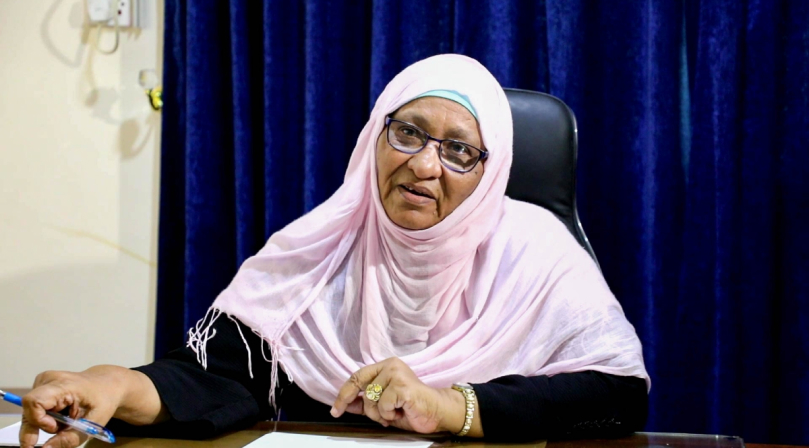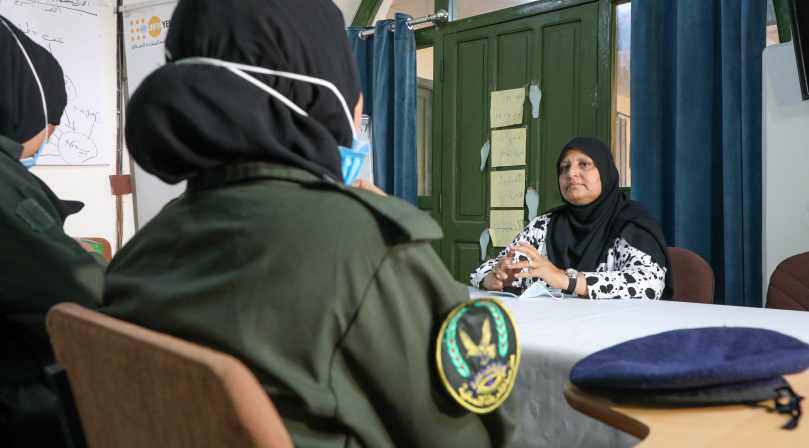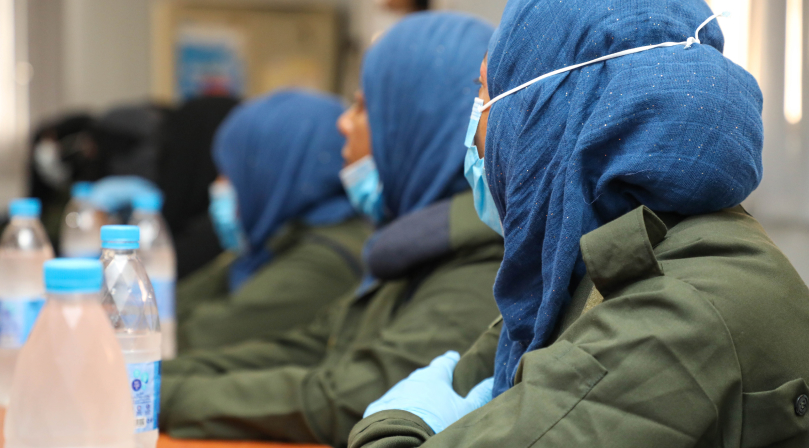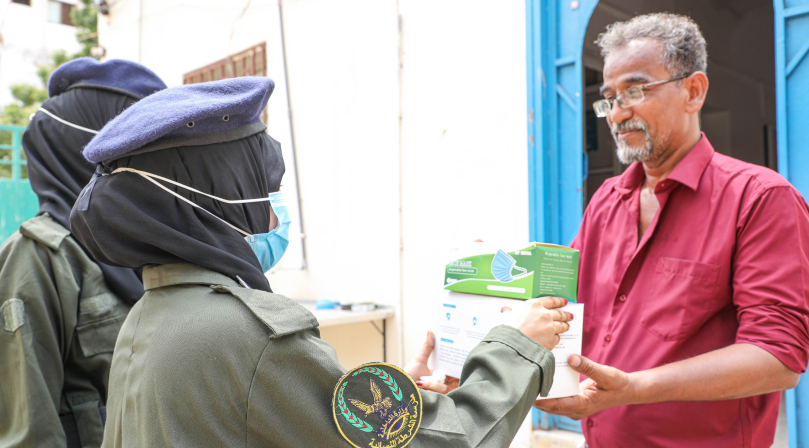Impact by Regions, Countries & Territories
UNDP’s Global Programme supports crisis-affected contexts across all regions to strengthen the rule of law and human rights. In this section, we present five regional overviews, detailing our priorities and approach depending on the context, as well as feature select country and territory results from 2021.
Five contexts from the list (Central African Republic, Democratic Republic of the Congo, Haiti, Mali and Yemen) illustrate the achievements of the Global Focal Point for the Rule of Law (GFP). In peacekeeping missions and transition settings, UNDP’s Global Programme works through the GFP to deliver integrated assistance with our UN partners.
GFP Global Focal Point Highlights
Political
Engagement
The rule of law is essential for sustainable peace and resilient economies, as well as for the prevention or recurrence of conflict. To prevent or address injustice, inequalities or democratic deficits, UNDP works with multiple stakeholders to operate in a way that is consistent with the rule of law and creates opportunities for all individuals to exercise their rights and access justice.
Institution
Building
The importance of strong institutions is more evident than ever as countries and communities respond to disruption, whether because of public health restrictions, climate change or political upheaval. Limitations on public gatherings and travel have revealed the need for institutions that are resilient to disruption.
Community
Security
2021 was a pivotal year that saw various developments affecting peace and security around the world. Civic space continued to shrink and the social contract between states and citizens was increasingly challenged, particularly during and after the response to the COVID-19 pandemic. Facing distressing consequences of climate change, states and communities are forced to manage more cross-border conflicts, triggered by the displacement of people seeking increasingly scarce resources.
Human Rights
Systems
The scope of human rights challenges is widening, from eroded public trust and shrinking civic space to ongoing inequality and human rights impacts in the socio-economic repercussions of the COVID-19 pandemic, and emerging risks in the digital sphere. National human rights institutions (NHRIs), along with other human rights defenders, are facing rising and sophisticated forms of reprisals for carrying out their work.
Access to
Justice
Sustainable Development Goal 16 (Peace, Justice and Strong Institutions) of the 2030 Agenda highlights the importance of access to justice for all for the development of peaceful and inclusive societies. Meaningful access to justice can only be achieved when people know their rights, have the opportunities, agency and capacities to claim them, and have access to independent, inclusive and people-centred justice systems that will respond in a timely, fair and effective manner.
Transitional
Justice
Without justice, there can be no lasting peace. In post-conflict, crisis-affected and fragile contexts, truth-seeking initiatives and reconciliation efforts are essential to bring peace to affected communities. The COVID-19 pandemic has slowed down transitional processes as states prioritized their response to the health crisis and measures to support the economy.
Gender
Justice
In 2021, the continued erosion of democracy and the spread of authoritarian trends in politics in many parts of the world contributed to a backlash against women’s rights. The COVID-19 crisis has reversed some of the hard-won gender parity gains by exacerbating pre-existing inequalities and power imbalances. It has also caused a dramatic increase in sexual and gender-based violence (SGBV). All these challenges have been particularly acute in conflict, fragile and crisis-affected settings.
Innovation
New ideas and new strategies are critical to building sustainable and effective development approaches that really meet people’s needs. Technologies and globalization raise new human rights concerns and threaten the rule of law. Responses to the COVID-19 pandemic continue to limit people’s access to basic services. UNDP connected expertise across the globe to learn and adapt. Creating a culture of curiosity and experimentation, these efforts ensured that local needs and expertise were combined with emerging models to bring strategic thinking to people-centred development goals.

Yemen
During 2021, UNDP launched the second phase of its rule of law programme “Promoting Inclusive Access to Justice” (PIAJ: Phase 2) focusing on strengthening the rule of law and human rights in both the north and the south of the country. The inception of the second phase has been designed and implemented in partnership with institutions, UN partners, international community, civil society and academia to model best practices through locally-based rule of law technical committees in Aden and Sana’a.
It was also in 2021 that the Phase 1 project “Enhanced Security and Protection at the Local Level in Yemen” was successfully completed. It was designed to support safety, security and the protection of citizens, and equitable access to justice at the local level, based on community prioritization of their own security and justice needs, and building upon existing community capacities to collaborate in addressing these needs. The project activities were implemented at the individual, community and institutional levels with the following results achieved: 1) human rights and gender-sensitive police response to COVID-19 were strengthened; 2) response to gender-based violence (GBV) by multisectoral service providers amid the COVID-19 pandemic was improved; 3) institutional coordination across police, public health and women’s specific services was enhanced; and 4) inclusive security governance and rule of law for bottom-up peacebuilding were promoted.
UNDP supported activities that improved access to justice services for 16,586 people:
- 204 GBV survivors benefitted from referral services.
- 15,134 women, youth, persons with disabilities, and other vulnerable people benefited from awareness-raising activities on handling improvised explosive devices (IED).
- 1,248 community members benefited from the establishment of phone trees to facilitate reporting of IED cases to security actors in Mukalla and Taiz. Furthermore, 30 judges and prosecutors (including five women) were trained on evidence-based handling of IED cases in the criminal justice process.


To further facilitate an improvement in access to justice, rule of law institutions in 11 locations were rehabilitated and operationalized. Six districts in three southern governorates (Aden, Lahj and Hadramout) benefitted from improved community safety. Additionally, UNDP contributed to curbing the spread of COVID-19 in the rule of law institutions through the distribution of 5,000 items of personal protective equipment (PPE), and 5,000 awareness-raising posters to the police services in Aden and Mukalla benefitting 815 personnel (including 204 women).
Under Phase 1, additional activities were initiated to empower women to enhance protection against COVID-19, progressing towards gender justice and health security. UNDP conducted COVID-19 prevention and response training for 220 women police officers (150 in Aden and 70 in Mukalla) and 20 women social and health workers (10 in Aden and 10 in Mukalla). In addition, a group of 20 women leaders (women police, social and health workers) participated in governorate COVID-19 Task Force meetings in these regions. As a result, with UNDP’s guidance, the Ministry of Public Health (MoPH) in Mukalla issued an official decree to include women leaders on the COVID-19 Task Force. The project had a strong focus on dialogue, bottom-up approaches, local solutions and empowerment between the communities and the institutions that serve them.


Overall, UNDP translated the concept of gender justice into practice as part of its rule of law programming in Yemen, following the development and adoption in 2019 of the first National Action Plan (NAP) to Implement UN Security Council Resolution 1325 on Women, Peace and Security (WPS). In 2021, UNDP supported the Internationally Recognized Government with an implementation plan for the WPS NAP. UNDP’s project-level gender justice work (women, security and justice sectors) in Phase 1 was aligned with the initiation of WPS in Yemen. Guidance was developed for the legal community, including judges, lawyers, prosecutors, and legal assistants on how to address GBV cases. As part of UNDP’s joint initiative with UN Women, the UN Economic and Social Commission for West Asia (ESCWA) and the UN Population Fund (UNFPA), legislative assessments of gender equality were conducted, aimed at establishing and building an enabling environment for the strategy to be implemented.
For Phase 2 of its rule of law programming in Yemen, UNDP will maintain a focus on piloting model approaches (customized through community and institutional engagement/
dialogues) to rule of law institutions connected with the communities that they serve across four districts: two in Aden and two in Sana’a. The models will be piloted for a three-year period, ensuring bottom-up approaches, improving the functioning of the institutions, their connection to one another (including referral processes) and the participation of the communities (of each of the four project districts). Moreover, developing and integrating bottom-up rule of law approaches also contributes to a space for local peace dividends.
Key Results: Yemen
UNDP improved access to justice services for 16,586 people.
5,000 items of personal protective equipment (PPE) were distributed in Aden and Mukalla. 5,000 awareness-raising posters were provided for the police in the same regions, and eight awareness-raising radio flashes were broadcasted (four in Aden and four in Mukalla) as measures to counter COVID-19, benefitting 815 security personnel, including 204 women.
In 2021, six districts in three southern governorates (Aden, Lahj, and Hadramout) benefitted from the improved community safety. Eleven rule of law facilities (three in Aden, five in Sana’a, two in Hodeida, one in Mukalla) were rehabilitated, including police stations, courthouses, and prisons. 922 rule of law personnel received community safety and security trainings.
